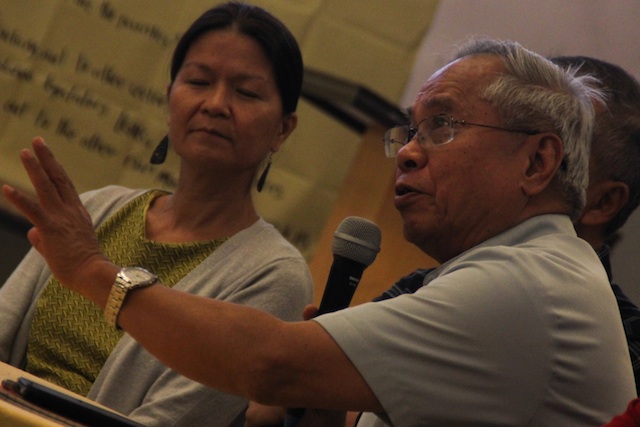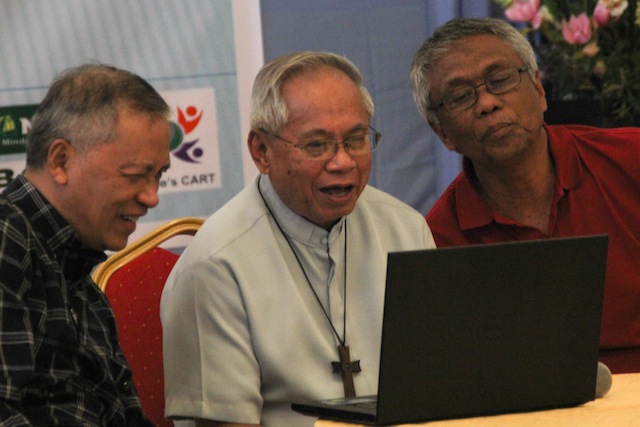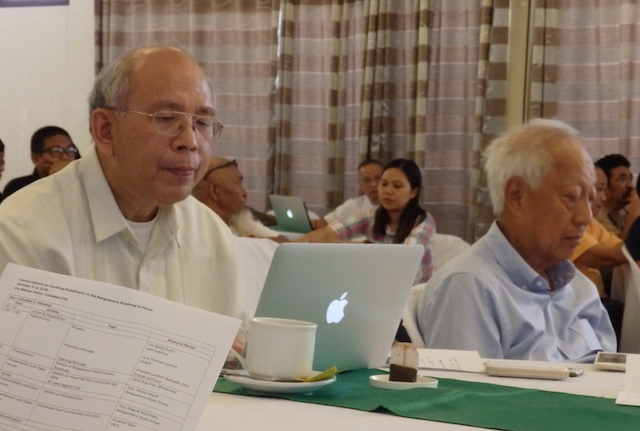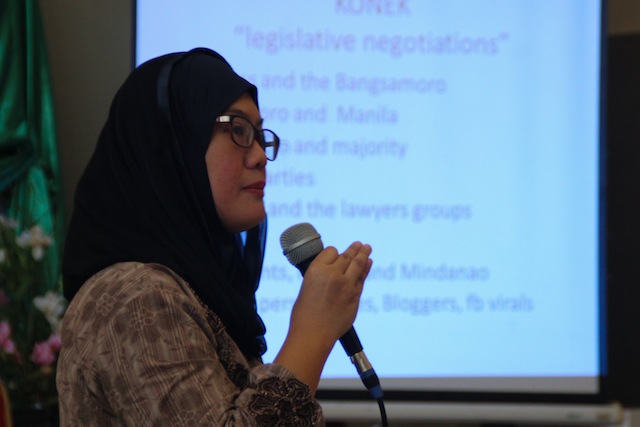The biggest roadblock to the passage of the Bangsamoro Basic
Law (BBL) is “the fear of the legislators about the BBL as originally
presented,” Mindanao ’s lone Cardinal said.
Biases and prejudices that exploded into the public sphere
after the January 25 Mamasapano Tragedy also “influenced legislators in their
deliberations of the original BBL,” Cardinal Orlando Quevedo, Archbishop of
Cotabato and lead convener of the Friends of Peace, told a press conference at
the end of the two-day “Conversations Hurdling the Roadblocks to the Bangsamoro
Roadmap to peace” on Tuesday.
“They wanted to change the BBL because of these fears and
prejudices about not only what happened in Mamasapano but also about what the …
Bangsamoro would do if given a lot of authority, if given a lot of power and
financial autonomy… There’s a lot of fear also based on prejudice,” he said.

Cardinal Orlando B. Quevedo, OMI, Arcchbishop of Cotabato adn lead convenr of Friends of Peace with Yolanda Esguerra, national coordinator of the Philippine Misereor Partnership, Inc., at the press conference Tuesday afternoon after the two-day “People’s Conversations on Hurdling Roadblocks in the Bangsamoro Roadmap to Peace.” MIndaNews photo by TOTO LOZANO
Yolanda Esguerra, National Coordinator of the Philippine Misereor Partnership, Inc. pointed to the understanding of lawmakers on constitutionality. She noted that lawmakers have repeatedly been citing alleged unconstitutionality of the BBL provisions when several legal experts and the Peace Council had carefully studied the BBL and said it is constitutional but “matigas yung position ng mga lawmakers (Lawmakers are firm in their position) maybe because …. of bias and fear,” she said.
Gus Miclat, executive director of the Initiatives for
Internatioal Dialogue (IID) said what is more tragic is that “fear sometimes
emanates from ignorance.”
He cited an example where they brought a team from the MILF
to the Visayas to explain the Bangsamoro peace process and what the future
Bangsamoro political entity would be. “Pagkatapos nilang mag-explain, the
audience said ‘gusto namin yan, para sa amin din,’” (After they explained, the
audience said, ‘we also want that, that’s also for us).
For Dr. Pendatun Pangadil, chair of the Peoples’ CART
(Coalition for ARMM Reform and Transformation), “there is really a need to
deepen further their (members of the House and Senate) idea of what is really
the Bangsamoro.”
He said he hopes legislators find time to know and
understand the Bangsamoro identity.
Guiamel Alim of the Consortium of Bangsamoro Civil Society
said the sentiments of residents at the grassroots are mixed because the fate
of the BBL is uncertain. He said residents in conflict-affected areas have been
hoping peace would be realized by the passage of the BBL so they could live in
peace, send their children to school and improve their livelihood.
Challenges, Roadblocks
In his speech earlier in the afternoon, Quevedo said the substitute bills – HB 5811 and SB 2894 – “were crafted in the wake of Mamasapano, which was truly a disastrous blunder.”
In his speech earlier in the afternoon, Quevedo said the substitute bills – HB 5811 and SB 2894 – “were crafted in the wake of Mamasapano, which was truly a disastrous blunder.”
“I must confess that I do not see any party that is free of
responsibility from the tragedy. But Mamasapano definitely changed the horizon
of the peace process and the BBL. For from Mamasapano came the roadblocks to
peace.”
Quevedo said mistrust, bias and prejudice, fear, and
paranoia against Muslims have “determined the opinion of the Christian majority
population, including so called intelligentsia, church people, media pundits,
and media networks” and that this “biased attitude is at the heart of their
rejection of any BBL, including the versions being prepared by the legislators,
despite ignorance of the actual content of the BBL.”

Gus Miclat of the Initiatives for International Dialogue, Cardinal Orlando B. Quevedo, and Guiamel Alim of the Consortium of Bangsamoro Civil Society. MindaNews photo by TOTO LOZANO
The Cardinal cited five major challenges confronting peace advocates: “the misperceptions of legislators and their revisions to the original BBL; the continuing dissemination of such misperceptions by media; the fundamental attitudes and misperceptions of the great majority of Filipinos; the overweening desire to win the votes of the majority in the 2016 election; and the inexorable constriction of time for the passage of an acceptable BBL.”
He listed eight major roadblocks to the Bangsamoro roadmap
to peace. These are:
-- The perception of legislators and of several legal and
constitutional experts regarding the constitutionality of the
Framework Agreement, the Comprehensive Agreement, the BBL and many of its
provisions; the expert opinion of other legal and constitutional luminaries are
ignored;
-- Legislators’ perception that the original BBL was a formula
for the establishment of a separate and independent State;
-- That it will result in the dismemberment of the
Republic;
-- Their revisions are therefore the result of
these perceptions.
-- Therefore, the revisions insist that the powers devolved to
the Bangsamoro government should generally be at par with LGUs, thus
effectively treating the “autonomous region” as an LGU and less
autonomous than the present ARMM.
-- Underlying these perceptions and revisions is an
attitude of mistrust, bias and prejudice, fear and even paranoia with
regard to the MILF and to Muslims in general – an attitude that exploded into
the public sphere as a result of Mamasapano.
-- But such mistrust, bias and prejudice, fear, and paranoia
against Muslims have determined the opinion of the Christian majority
population, including so called intelligentsia, church people, media
pundits, and media networks. This biased attitude is at the heart of
their rejection of any BBL, including the versions being prepared by
the legislators, despite ignorance of the actual content of the BBL.
-- Already sharing the same attitude as the majority,
legislators are driven by public opinion to reject the BBL or support a
“watered down” version of it. Revisions and even rejection are in view
of the 2016 elections. They want to cater to the votes of the
majority. It is not entirely whimsical that three of the most vocal senators
against the BBL have announced their candidacy for Vice-President.
Mistrust and Prejudice
Reducing biases and prejudices is a “life-long task of
family upbringing, formal and informal education, reinforced by faith-formation
by religious denominations,” Quevedo said. He said this requires engaging
institutions, declaring schools as zones of peace and harmony through a
dialogue of life, and collaboration among religious denominations through
Inter-Religious Dialogue.
He urged parishes, mosque communities, Christian worship
services to do advocacy work through seminars, workshops, fora, assemblies, to
“know the original BBl, read and learn, form your mind and conscience on the
basis of your personal in-depth knowledge of the original BBL and not on the
basis of bias and prejudice.”
He also urged the public to “engage your local LGU
executives; help them know the original BBL, and disengage them from their
misperceptions and biases” and engage as well the Representatives in Congress
to “let them know the original BBL and disseminate personally to them a
comparative analysis of the original BBL and the versions they are supporting,”
and to “point out to them the practical consequences of their revisions that
make the Bangsamoro less autonomous than the present ARMM.”
Members of both House of Congress, he said must be made
“aware that social justice long denied the Bangsamoro is in their hands, and
now is the time not to squander the opportunity of laying down the foundations
of a just and lasting peace” and to appeal to their sense of the common good of
all “especially of peoples’ long deprived of their right to self-determination
accorded by the Constitution.”
Corrected by Constitution
Lawyer Christian Monsod, former chair of the Commission on
Elections and a member of the 1986 Constitutional Commission explained in the
morning session that the creation of an autonomous region in Muslim Mindanao as
enshrined in the 1987 Constitution is a social justice issue and was meant
precisely to help correct historical injustices committed against the Moro
people.

Fr. Joel Tabora SJ, President of the, Ateneo de Davao University and Atty. Christian Monsod, former Comelec chair and a member of the 1986 Constitutional Commission. MindaNews photo by CAROLYN O> ARGUILLAS
He said when they drafted the 1987 Constitution, “we recognized the shortcomings of the Christian majority and our failure to celebrate the resistance of the Muslim people against foreign colonizers. We were easily coopted but they refused to be subjugated. And that is as should be, a source of pride, as it should be pride for us and we owe it to them to give it to them, what they fought for with blood and we easily acquiesced to.”
Fr. Joel Tabora, SJ, President of the Ateneo de Davao
University said, “we have to educate the Christians Christian majority. Our
treatment of Philippine history, of the Bangsamoro history, the Mindanao history is very deficient and we need to work on
this.’
This includes creating new textbooks, he said, a process
that takes time because “you’re undoing many decades of poor teaching and
lopsided teaching about the Bangsamoro but that has to be done.”


No comments:
Post a Comment
Note: Only a member of this blog may post a comment.